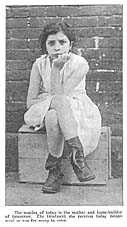

 Social workers and philanthropists took a special interest in poor women
in repeated trouble with the law and lamented the fate of their children.
Since 1916, the Vermont Conference of Social Work and the Vermont Children's
Aid Society had campaigned for expanded programs of child support and family
case work. Lena Ross, a probation officer and field worker for the State
Board of Charities and Probation, had initiated a rehabilitation program
for female delinquents at the Women's Reformatory at Rutland in 1921, one
that was celebrated as a demonstration the spirit of charity, self-sufficiency,
and resourcefulness of Vermonters. In 1929, at the request of Superintendent
Lena Ross, Eugenics Survey field investigator Martha Wadman conducted IQ
tests of the women inmates of the Rutland Reformatory for the Vermont Commission
on Country Life Committee on the Handicapped.
Social workers and philanthropists took a special interest in poor women
in repeated trouble with the law and lamented the fate of their children.
Since 1916, the Vermont Conference of Social Work and the Vermont Children's
Aid Society had campaigned for expanded programs of child support and family
case work. Lena Ross, a probation officer and field worker for the State
Board of Charities and Probation, had initiated a rehabilitation program
for female delinquents at the Women's Reformatory at Rutland in 1921, one
that was celebrated as a demonstration the spirit of charity, self-sufficiency,
and resourcefulness of Vermonters. In 1929, at the request of Superintendent
Lena Ross, Eugenics Survey field investigator Martha Wadman conducted IQ
tests of the women inmates of the Rutland Reformatory for the Vermont Commission
on Country Life Committee on the Handicapped.
The documents included here show different portraits of the women inmates at the Rutland Reformatory. Sara Cleghorn's and Dorothy Canfield's article, "Miss Ross' Girls," does not betray Lena Ross' confidential concerns and minimizes the problems studied by Martha Wadman. Lillian Ainsworth's addendum to "Miss Ross' Girls," "On the Side," celebrates the community support of delinquent women with children, yet contrasts with her stong support for eugenics in her 1941 report to the Vermont Department of Public Welfare, "Vermont's Feeble-minded Problem." The "Report of the Survey," by an unidentified social worker, presents a rebuttal to Wadman's report, illustrating the ambivalence often expressed among social workers over the validity of IQ tests and their alleged basis in heredity. Martha Wadman's notes on the psychometric tests of the women suggest the influence of personal impressions on the evaluation of intelligence. In its final report, the Eugenics Survey did not discuss sterilization of "feebleminded" women, yet left the door open for either eugenic or social interpretations and solutions.